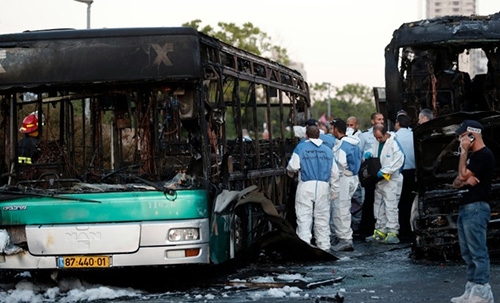Israel says Hamas suicide bomber attacked Jerusalem bus
Jerusalem: Israeli police said Thursday a Hamas militant carried out a "suicide" bus bombing in Jerusalem that wounded 20 people, in the first such attack since a wave of violence erupted in October.
The attacker, a 19-year-old from Beit Jala near Bethlehem in the occupied West Bank, died from his wounds on Wednesday, two days after the bombing.
Hamas had previously said he was a member of the militant group and that he had carried out the attack, while his mother told AFP he had idolised an assassinated bombmaker from the Islamist movement.
Israeli police lifted a gag order on elements of the case on Thursday, confirming Abdel Hamid Abu Sorur as the assailant and specifically calling it a "suicide attack".
The police also said they made several arrests of Hamas militants suspected of helping to plan the bombing.
Monday's bus attack is the first suicide bombing in a nearly seven-month wave of violence.
Most of the attacks have been stabbings, while car-rammings and shootings have also occurred.
While Hamas praised his actions and hailed him as a martyr, the Islamist movement that runs the Gaza Strip did not formally claim the attack.
It said his death "will continue to fuel the uprising".
Hamas officials in Gaza declined to comment on Thursday, only welcoming the attack.
His mother, Azhar Abu Sorur, told AFP in an interview that she did not know he was a Hamas member.
On Monday before the bombing, she said "he was normal and we ate lunch together and he was laughing. Then he told me he was going out to buy something and will come back."
"Everyone was with the resistance and supporting the resistance," she said. "But for him, his role model was Yahya Ayash."
She said her son used an image of Ayash, the Hamas bombmaker known as "The Engineer" who was assassinated by Israeli agents in 1996, as his social media profile picture.
"I would have chosen a different path of resistance than my son's path, but this is what happened and I respect that," she said.
"He is free and this is what he wanted."
- Concerns ahead of Passover -
The family said Israeli authorities had ordered his father to take a DNA test.
The Hamas-affiliated Palestinian Information Center website cited the father as saying he had been asked to identify his son's badly burned body.
The bomb on Monday exploded aboard a bus in a relatively isolated area of Jerusalem, sparking a fire that spread to another empty bus and a car.
It occurred with tensions high following the wave of knife, gun or car-ramming attacks that has left 201 Palestinians and 28 Israelis dead since last October.
The level of violence had decreased in the weeks before the bombing, though there have been concerns the Jewish Passover holiday beginning Friday evening could lead to a new surge.
Israeli authorities say they are increasing security for the eight-day holiday.
Bus bombings were common during the second Palestinian intifada, or uprising, in the early 2000s, but Monday's attack was the first bomb targeting a bus in Jerusalem since 2011, when a British tourist was killed.
In Tel Aviv, a bomb exploded on an empty bus in 2013 in what Israeli authorities called a "terrorist" attack.
Many analysts say Palestinian frustration with Israeli occupation and settlement building in the West Bank, the complete lack of progress in peace efforts and their own fractured leadership have fed the recent unrest.
Israel blames incitement by Palestinian leaders and media as a main cause of the violence.
Related Posts

